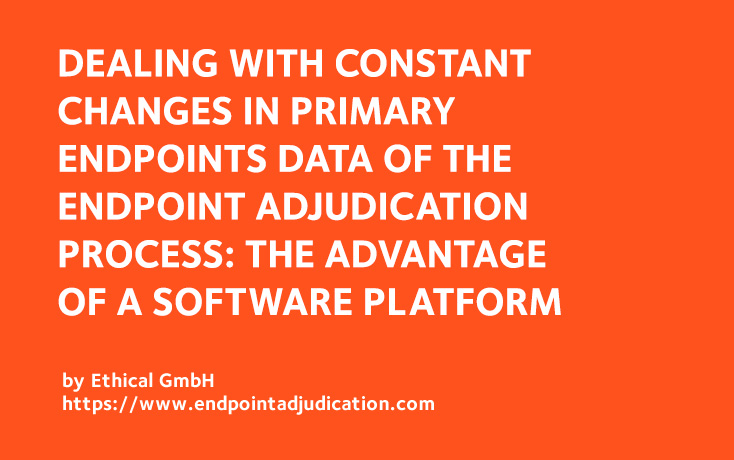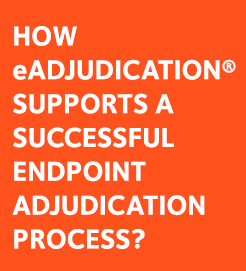The complexity of clinical trials is well known and it is one of the principal reasons for adjudicating certain clinical endpoints. If the primary endpoint is being adjudicated by an independent committee, the validity of the results of the study is directly dependent on the quality of the data provided during the adjudication process. An additional difficulty emerges in this context. Changes, corrections or additions to patient data frequently occur during the course of a clinical trial and may impact endpoints assessment. Ensuring close monitoring and facilitating prompt action in a context of changes in patient data is the role of a well-thought endpoint adjudication platform.
All the critical data collected during a clinical trial are verified for accuracy and completeness by software algorithms (edit checks) and by site monitors who check patients’ files on site. Protocol adherence is also monitored centrally by the medical team. In addition, the most delicate endpoints are often adjudicated by external independent committees. A clinical trial manager may look at their clinical trial dashboard and all they see is green. Performance indicators show that the study is moving per schedule. Enrolment is going well, data collection is steady, queries are low, there is only a handful of minor protocol deviations and adjudication has been performed for all required data related to the primary endpoint. All is good. Or is it?Hiding in the complex procedures of collection, classification and reporting of clinical data are additional risks. The amount of information exchanged during these processes is staggering… and constantly changing. Indeed, changes in the clinical database are made all along the conduct of a clinical trial either due to sites’ internal QC, sponsor-issued queries resolution or because of new information retrieved at the site. While serious adverse events are closely monitored by the drug safety department for changes and complementary information, there is no standard mechanism for tracking changes in the clinical data as they occur, even for the primary endpoint of the study, because there is no immediate impact on the statistical analysis of the result which only occurs after the final lock of the clinical database. All that matters at this stage is to ensure the quality of the data.
In contrast to the final statistical analysis, clinical endpoint adjudication is performed continuously during the study using a snapshot of the data as it stands at the time of adjudication of each case. Once the case is assessed, the result of the adjudication is recorded and the case is marked as closed. However, especially if the primary endpoint of the study is being adjudicated, regular checks should be run to determine whether patient information has changed in any way since adjudication was performed. Some of these changes may impact the adjudication result of study endpoints including the primary endpoint and that is susceptible to even change the overall outcome of the study.
Patient information reported in the clinical database is not carved in stone. It is often updated, complemented, changed or rectified. Some of these changes may warrant a reassessment of the primary endpoint or one of the secondary endpoints of the study.
Discovering such changes at the end of the study (or worse, not at all) may have an impact on the outcome, validity and quality of the results. It is therefore paramount to monitor changes to the patient data and to be able to trigger a re-assessment of the endpoints by the independent committee. This is exactly what eAdjudication® is able to do by establishing a direct link to the clinical database and by executing dedicated algorithms that look for changes in the data. Specific rules programmed in the software trigger a re-assessment workflow and send the case to the appropriate reviewers.
As in all scientific investigations, clinical trials seek to confirm or reject a hypothesis (generally the hypothesis that a new drug is efficient and safe at the selected doses in fighting a given disease). In order to conduct such investigation, scientists select the most representative outcome (a measurable change in health, function or quality of life), agree on the target value (endpoint) and calculate the size of the sample allowing a reasonable estimation of the true effect (power of the trial). It is good scientific practice to only ask one question at a time; therefore, a single primary endpoint should be selected whenever possible. In summary, the primary endpoint of a clinical trial is the endpoint based on which subjects are selected (and randomized) and for which the trial is powered. Secondary endpoints are endpoints for which the trial may not be powered nor randomized.
Because the results of the primary endpoint are the key to the success or failure of the trial, in addition to the blinding of patients and investigators to the actual treatment (double-blind), complex primary endpoints are increasingly adjudicated by independent committees of experts who have no financial or other interest links to the drug or the sponsor company. This process known as clinical endpoint adjudication removes any residual bias and strengthens the quality and validity of the primary endpoint results. Secondary endpoints are less frequently adjudicated.








